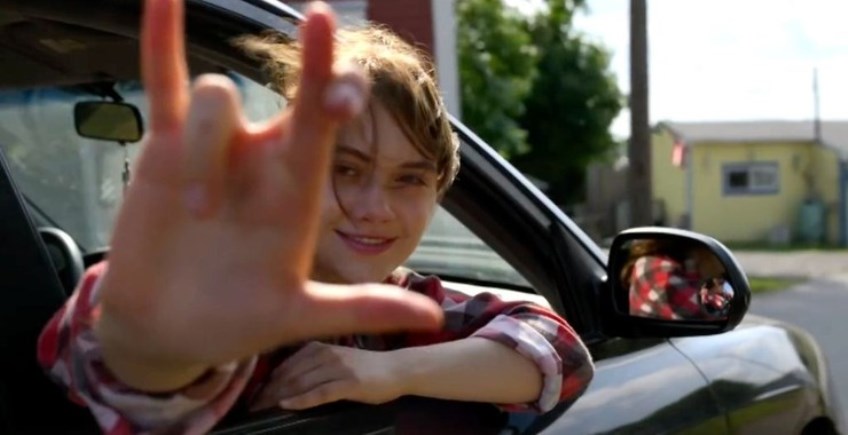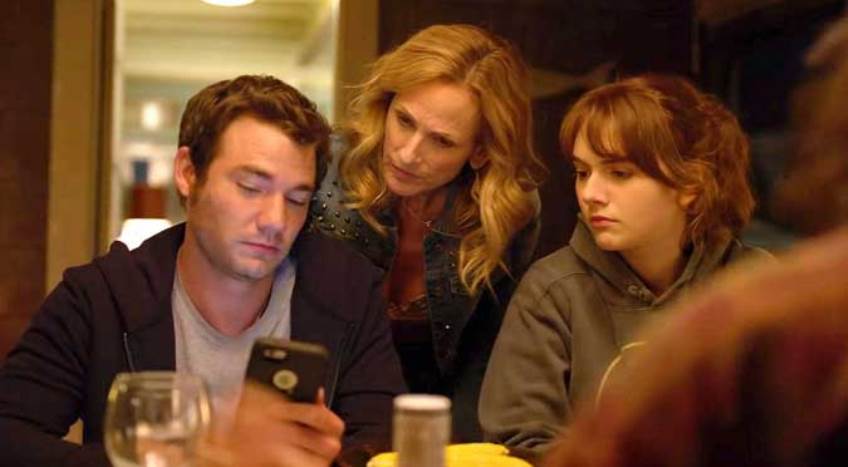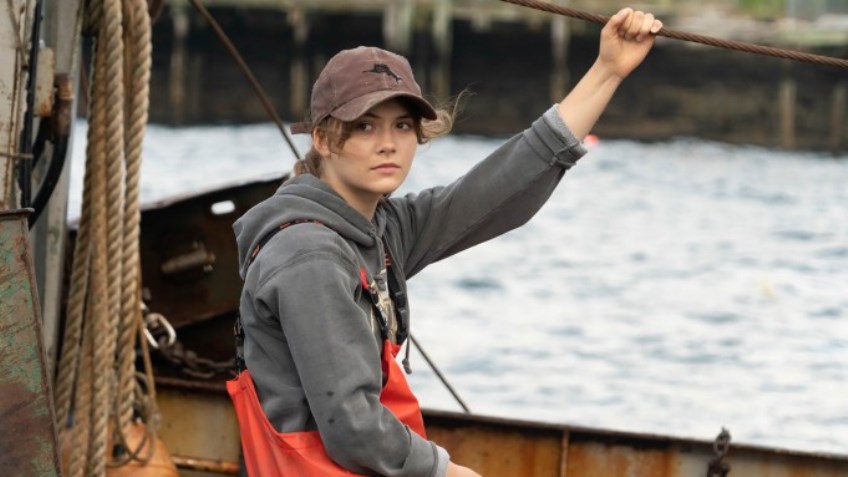Joyce Glasser reviews CODA (now streaming on Apple TV +) 12A, 112 mins.
CODA, financed by Apple, is the first film about a deaf family co-starring three deaf actors to win a BAFTA for Best Adapted Screenplay. The three are Marlee Matlin (Jackie Rossi), Troy Hotsur (Frank Rossi) and Daniel Durant (their son, Leo Rossi) Hotsur also made history for becoming the first deaf actor to win a best supporting actor BAFTA. The film portrays the deaf characters not as disabled victims, but as financially independent, hard-working and as heroes in their community.
So, there is a lot going for CODA, which has won hearts and votes for the upcoming Academy Awards. But there is no getting around the problem that this is an “adapted” screenplay, and a close adaptation at that, from a formulaic and painfully predictable French film, entitled La Famille Bélier.
There are a few noteworthy differences. Instead of watching a farming family in rural France, Boston born writer-director Sian Heder sets her remake in the picturesque coastal town of Gloucester, Massachusetts, giving us stunning backdrops. We are treated to picturesque harbour scenes that will look familiar to those who saw Kenneth Lonergan’s 2017 drama, Manchester by the Sea.
A more important change is that while the Béliers look well off enough to afford to hire a farmhand if not a separate interpreter, the Rossi’s cannot afford to substitute their hearing-speaking daughter, Ruby (Amelia Jones) for a paid employee.

Instead of running to be mayor, as in the French version, father-husband, and beleaguered boat owner Frank Rossi (Kotsur, in the most nuanced performance) protests against the middlemen taking his money and dares to set up a risky cooperative; a venture requiring the deaf family to integrate with the other fisherman.
The most significant difference is that deaf actors play all three deaf characters. It is interesting, however, that this was not Heder’s demand, but a condition of Academy Award winning (Children of a Lesser God) Matlin’s participation. Good for her!
The story could not be more familiar. A child, in this case, Ruby, rebels against her parents (Hotsur and Matlin) to follow her dream and God given talent. She is helped by a saintly teacher-mentor, in his case, choir master Mr Villalobos (Eugenio Derbez) and encouraged by selfless crush-turned-boyfriend, Miles (Ferdia Walsh-Peelo).
In the familiar story, the child’s love for her parents and feelings of guilt cause her to abandon her dreams. The tension in the plot comes from the resolution of this unhappy situation. Will the parents’ love enable them to make a similar sacrifice? There is another obstacle to overcome. Ruby is bullied because her deaf parents collect her at school with the radio blasting (Frank hears the reverberation of rap music which he loves) and because she cycles to school from the dawn catch smelling of fish. Will her participation in the choir and talent and the interest shown by the popular Miles reverse this situation?
The big twist is that the family members are deaf, except for the second of the two children, Ruby who, ironically, has a golden singing voice. This makes the parents’ objections to her dream more interesting. They naturally have concerns that their child will fail in a precarious industry (particularly as they cannot hear her voice and judge for themselves). But their main objection seems to be a selfish one: they will lose a free boat hand and interpreter, who has been on call 24/7 all her life.

This selfish objection is understandable, but hardly endears us to the parents, particularly when the demands of Frank and Jackie’s co-op business conflict with Ruby’s studies. Mr Villalobos is impressed enough with Ruby to offer her pro-bono coaching for an audition at Berklee College of Music in Boston. In a scarcely credible scene, the parents schedule an important televised news interview that will promote their venture without having told Ruby, let alone having cleared it with her schedule.
Such careless writing also characterises the relationship between Ruby and Miles. Ruby has a crush on Miles before she joins him in choir practice. When they are paired up to sing a duet (at what is curiously the Autumn Concert, although it seems the action takes place in early summer, just before graduation) they fall in love. Yet when Miles tries to convince a defensive Ruby that he was not laughing at her family, but with them, as they are a breath of fresh air next to his miserable, though physically “normal” family, she shows no interest in his family problems. Similarly, when (and this is a spoiler) circumstances are such that he will not be going to Berklee, Ruby shows no interest in where he will study, and what he will do in life.
The French film was also controversial due to the questionable humor in the portrayal of the parents. Although Ruby is spared from having her panties paraded before Miles when she gets her period (yes, that happens in the French version), she is not spared the ordeal of interpreting for the doctor who tells her parents that their crotch itch is due to humidity (from the boat) and they cannot have sex for two weeks. When Miles inadvertently discovers the couple having wild sex in the afternoon, Ruby is not only humiliated, but reminds her parents about the doctor’s orders. Focusing on this strong sexual appetite might be meant to show that deaf people have normal sexual urges, but the script goes overboard and risks turning the couple into buffoons.
Fortunately, Jones, who learned American sign language for the role, is a good actress with a great voice and her rendition of Joni Mitchell’s I Looked at Life from Both Sides Now is the showstopper. It is a shame, however, that most of the song – sung to her parents in the film’s climactic scene – is sung off camera over a montaged denouement. And beautiful as it is, the choice of the song is odd, as by this point, Ruby – and, as we see in an emotional father-daughter scene, Frank – have learnt the meaning of love – and from both sides.




